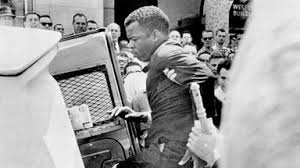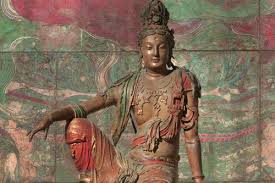
On July 17, the US lost Congressman John Lewis (D-GA), one of the real giants in the American Civil Rights Movement for 60 years. As a young man, Lewis stood fiercely at the fulcrum of the strife between those demanding equal rights for all Americans and those who fought tooth and nail to preserve a status quo in which White privelege would extend its 350 years of ascendency in this country. A large number of us stood mute, believeing we were not racist while our silence preserved the centuries-old racist structures.
Civil Rights and Non-Violence
Lewis was an early compatriot of Dr. Martin Luther King, Jr. and together they personified one half of the internal struggle among those fighting for civil rights– those who followered Dr. King’s articulation of non-violence, and those who were revolutionary advocates of Black Power who were more than ready to meet violence with violence if necessary.
It was not that Lewis, who was beaten repeatedly in his efforts to repudiate

Jim Crow laws across the American South in the 1960’s, and arrested more than 40 times, was laid back, weak or lacking in courage. To the contrary, he was a firebrand and a fierce activist. But his and King’s advocacy of non-violent resistance for the rights of all Americans, regardless of race, provides a powerful counterpoint to today’s not infrequent outbreaks of property defacing, and occasionally violent actions in the streets following the police murder of George Floyd.
Lewis’ opponents inside the movement (Stokely Carmichael, for example, who replaced him as President of thye Student Non-Violent Coordinating Committee in 1966, and the Black Panthers, for example) could simply not understand how he could show such grace while being attacked by the most vile and hateful White supremisists. I often wondered the same.

King had been influenced in turn by Mahatma Gandhi’s successful non-violent independence campaign in India. He also wrote and spoke often of the Christian influence of his thinking. He sought to lead his own life and lead a campaign for justice by following what he believed to be the over-arching character of God’s love. That love, agape from the Greek, rose to the “level of loving the person who does the evil deed, while hating the deed that the person does,” King once said. “I’m happy Jesus didn’t say ‘Like your enemies,’ because it’s pretty difficult to like…somebody bombing your home or threatening your children, or seeking to destroy you.”
Lewis described his own “love thine enemy” counsel in his 1998 memoir, Walking with the Wind, A Memoir of the Movement. How in the world, I still find myself asking, can you love someone who is beating you, or clubbing and arresting you for peacefully demonstrating, or otherwise spewing hatred and violence against you? Lewis answered that perennial question thusly. “One method of practicing this [non-violent] approach, when faced with a hateful angry agressive even despicable person, is to imagine that person, actually visualize him or her, as an infant, as a baby. If you can see this full grown attacker who faces you, as a pure innocent child that he or she once was, it is not hard to find compassion in your heart.”
This distinction between loving a person and hating and fighting their evil deeds is a lesson for most of us. I wrote in an earlier post that I believed Baby Boomers were largely responsible for fundamentally coarsening the social fabric in our country over the last 50 years. It is but a small step from the kind of bitter factional conflict we boomers helped advance in today’s political landscape to hating the evil people on the other side of the debate. This, Lewis and King simply refused to do.
The Buddhist Tradition of Non-Violence

I have personally struggled with dialing back my own hate-filled reactions to people with whom I virulently disagree or with people who pursue what I deem to be evil and hateful actions. I have spent several years in pursuit of a practice of mindful meditation, sitting daily trying to expand my awareness of my own thoughts and feelings. I was recently introduced to the words of an 8th century buddhist monk, Shantideva, that I find myself sitting with in addition to those of Lewis and King. When someone hits you with a stick, Shantideva wrote, you don’t hate the stick that produced the pain. “Although it is their sticks that hurt me, I am angry at the ones who wield them, striking me. But they, in their turn, are driven by their hatred. Therefore, with their hatred I should take offense.”
Mindful Meditation on Loving Enemies
So, I will pursue, in my own fallible way, the teachings of John Lewis, Martin Luther King, Jr., and Shantideva. I will sit quietly in the mornings, eyes closed, focusing on my breath, envisioning those people whose deeds are hateful but who I am encouraged not to hate–police who perpetrate horrendous violence against Black men; legislators, prosecutors and judges who advance legal discrimination; and leaders who encourage mistrust, devaluation and hatred of people of color, immigrants, and people whose sexual and life-style preferences differ from theirs or their followers. I will envision loving them and hating their evil actions and the conditions in their lives that produced those actions. I will try to picture them as innocent infants, trying mightily to love them and hating and vowing to attack the influences that led them to their hateful and harmful ways.
I will know I have succeeded in my meditative quest if I can free myself from hating Donald J. Trump.
Namaste.

beautiful eulogy of the great John Lewis
Thank you. Everyone can do something. Trying to figure out the “good trouble” I can get in.